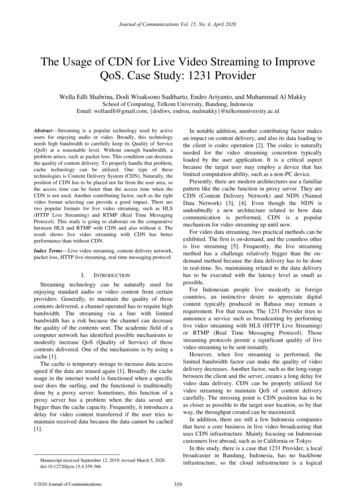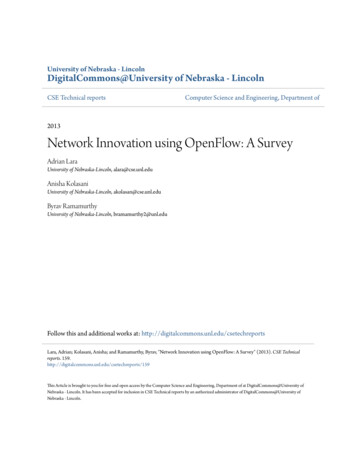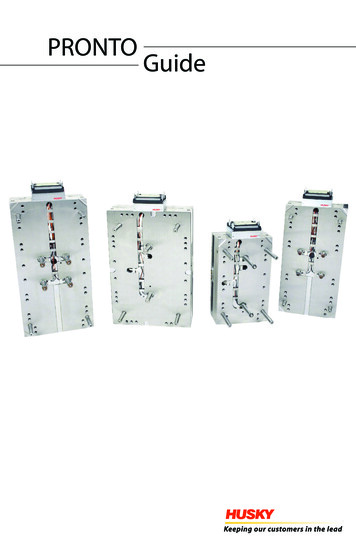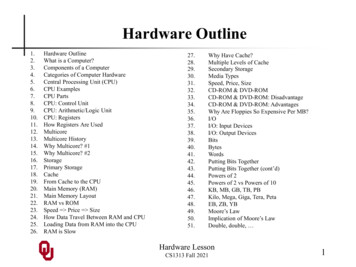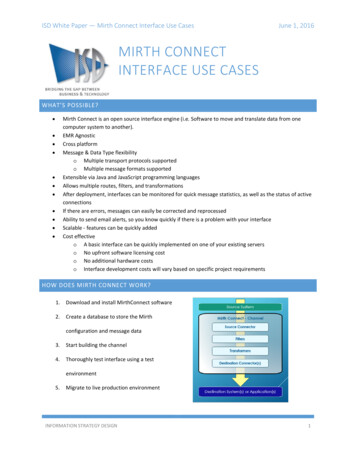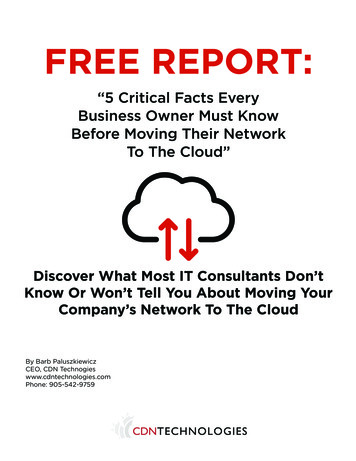
Transcription
FREE REPORT:“5 Critical Facts EveryBusiness Owner Must KnowBefore Moving Their NetworkTo The Cloud”Discover What Most IT Consultants Don’tKnow Or Won’t Tell You About Moving YourCompany’s Network To The CloudBy Barb PaluszkiewiczCEO, CDN Technogieswww.cdntechnologies.comPhone: 905-542-9759
A Letter From The Author:Why Did We Create This Report And Who Should Read ItFrom The Desk of:Barbara PaluszkiewiczCDN TechnologiesDear Colleague,When you decided to look into transitioning your computer network and operations to the cloud, you wereprobably met with conflicting advice, confusion and no real answers to your questions and concerns oversecurity, cost and whether or not it’s appropriate for your organization.That’s why we wrote this report. We wanted to give CEOs a simple, straightforward guide that not onlyanswers your questions in plain English, but also provides vital experiencebased information that mostIT companies don’t know (or may not tell you) that could turn your migration into a big, cash-drainingnightmare.My name is Barb Paluszkiewicz. My organization has been providing IT Services and Support to businesssince 1989. As Technology has evolved our core value has always remained the same, keeping your companyinformation safe, and getting you access to it fast. We have worked with 100’s of business in Mississauga tosecure the data and enable them to access it safely and quickly from where ever they are.The simple fact is, cloud computing is NOT a good fit for every company, and if you don’t get all the facts orfully understand the pros and cons, you can end up making some VERY poor and expensive decisions thatyou’ll deeply regret later. The information in this report will arm you with the critical facts you need to avoidexpensive, time-consuming mistakes.Of course, we are always available as a resource for a second opinion or quick question, so please feel free tocontact my office direct if we can clarify any points made in this report or answer any questions you have.Dedicated to serving you,Barbara PaluszkiewiczChief Executive OfficerCDN Technologies905.542.9759 www.cdntechnologies.com 2421 Bristol Circle Oakville L6H 5S9
5 Critical Facts You Must KnowBefore Moving To The CloudIn this report I’m going to talk about 5 very important facts you need to know before you considercloud computing for your company. These include:1. The pros AND cons you need to consider before moving to the cloud.2. Migration GOTCHAS (and how to avoid them).3. The various types of cloud computing options you have (there are more than just one).4. Answers to important, frequently asked questions you need to know the answers to.5. W hat questions you need to ask your IT pro before letting them “sell” you on moving all or part ofyour network and applications to the cloud.I’ve also included some actual case studies from other businesses that have moved to cloud computing,along with a sample cost-comparison chart so you can see the impact this new technology can have onyour IT budget.At the end of this report there is an invitation for you to request a Cloud Readiness Assessment todetermine if cloud computing is right for your particular business. I encourage you to take advantageof this before making any decisions since we’ve designed it to take a hard look at the functionality andcosts for you as a business and provide you with the specific information you need (not hype) to make agood decision about this new technology.What Is Cloud Computing?Wikipedia defines cloud computing as “the use and access of multiple server-based computational resourcesvia a digital network (WAN, Internet connection using the World Wide Web, etc.).”But what the heck does that mean?The easiest way to not only understand what cloud computing is but also gain insight into why it’s gainingin popularity is to compare it to the evolution of public utilities. For example, let’s look at the evolution ofelectricity.Back in the industrial age, factories had to produce their own power in order to run machines that producedthe hard goods they manufactured. Be it textiles or railroad spikes, using machines gave these companiesenormous competitive advantages by producing more goods with fewer workers and in less time. For manyyears, the production of power was every bit as important to their company’s success as the skill of theirworkers and quality of their products.Unfortunately, this put factories into TWO businesses: the business of producing their goods and thebusiness of producing power. Then the concept of delivering power (electricity) as a utility was introducedby Thomas Edison when he developed a commercial-grade replacement for gas lighting and heating usingcentrally generated and distributed electricity. From there, as they say, the rest was history.The concept of electric current being generated in central power plants and delivered to factories as a utilitycaught on fast. This meant manufacturers no longer had to be in the business of producing their own powerwith enormous and expensive water wheels. In fact, in a very short period of time, it became a competitivenecessity for factories to take advantage of the lower-cost option being offered by public utilities. Almostovernight, thousands of steam engines and electric generators were rendered obsolete and left to rust nextto the factories they used to power.What made this possible was a series of inventions and scientific breakthroughs – but what drove thedemand was pure economics. Utility companies were able to leverage economies of scale that single905.542.9759 www.cdntechnologies.com 2421 Bristol Circle Oakville L6H 5S9
manufacturing plants simply couldn’t match in output or in price. In fact, the price of power dropped sosignificantly that it quickly became affordable for not only factories but every single household in thecountry.Today, we are in a similar transformation following a similar course. The only difference is that instead ofcheap and plentiful electricity, advancements in technology and Internet connectivity are driving down thecosts of computing power. With cloud computing, businesses can pay for “computing power” like a utilitywithout having the exorbitant costs of installing, hosting and supporting it on premise.In fact, you are probably already experiencing the benefits of cloud computing in some way but hadn’trealized it. Below are a number of cloud computing applications, also called SaaS or “software as a service,”you might be using: Gmail, Hotmail or other free e-mail accounts Facebook NetSuite, Salesforce Constant Contact, Exact Target, AWeber or other e-mail broadcasting services Zoomerang, SurveyMonkey and other survey tools LinkedIn Twitter All things Google (search, AdWords, maps, etc.)If you think about it, almost every single application you use today can be (or already is) being put “in thecloud” where you can access it and pay for it via your browser for a monthly fee or utility pricing. You don’tpurchase and install software but instead access it via an Internet browser.What About Office 365 And Google Apps?Office 365 and Google Apps are perfect examples of the cloud computing trend; for an inexpensivemonthly fee, you can get full access and use of Office applications that used to cost a few hundred dollarsto purchase. And, since these apps are being powered by the cloud provider, you don’t need an expensivedesktop with lots of power to use them – just a simple and secure Internet connection will do on a laptop,desktop or tablet.Pros And Cons Of Moving To The CloudAs you read this section, keep in mind there is no “perfect” solution. All options – be it an in-house, onpremise server or a cloud solution – have upsides and downsides that need to be evaluated on a case-bycase scenario. (Warning: Do NOT let a cloud expert tell you there is only “one way” of doing something!)Keep in mind the best option for you may be a hybrid solution where some of your applications andfunctionality are in the cloud and some are still hosted and maintained from an in-house server. We’ll discussmore of this in a later section; however, here are the general pros and cons of cloud computing:Pros Of Cloud Computing: Lowered IT costs. This is probably the single most compelling reason why companies choose to movetheir network (all or in part) to the cloud. Not only do you save money on software licenses, but onhardware (servers and workstations) as well as on IT support and upgrades. In fact, we save our clientsan average of 15 to 25% when we move some or part of their network functionality to the cloud. So if youhate constantly writing cash-flow-draining checks for IT upgrades, you’ll really want to look into cloudcomputing. Included in this report are examples of how we’ve done this for other clients and what thesavings have been.905.542.9759 www.cdntechnologies.com 2421 Bristol Circle Oakville L6H 5S9
Ability to access your desktop and/or applications from anywhere and any device. If you travel alot, have remote workers or prefer to use an iPad while traveling and a laptop at your house, cloudcomputing will give you the ability to work from any of these devices. Life happens and cloud computingenables you to live and work with ease. Disaster recovery and backup are automated. The server in your office is extremely vulnerable to anumber of threats, including viruses, human error, hardware failure, software corruption and, of course,physical damage due to a fire, flood or other natural disaster. If your server were in the cloud and (Godforbid) your office was reduced to a pile of rubble, you could purchase a new laptop and be back up andrunning within the same day. This would NOT be the case if you had a traditional network and were usingtape drives, CDs, USB drives or other physical storage devices to back up your system.Plus, like a public utility, cloud platforms are far more robust and secure than your average businessnetwork because they can utilize economies of scale to invest heavily into security, redundancy andfailover systems, making them far less likely to go down. Most small to medium sized business can notjustify the cost and maintenance of these highly sophisticated servers and secure network environments. It’s faster, cheaper and easier to set up new employees. If you have a seasonal workforce or a lot ofturnover, cloud computing will not only lower your costs of setting up new accounts, but it will make itinfinitely faster. You use it without having to “own” it. More specifically, you don’t own the responsibility of having toinstall, update and maintain the infrastructure. Think of it as similar to living in a condo where someoneelse takes care of the building maintenance, repairing the roof and mowing the lawn, but you still havethe only key to your section of the building and use of all the facilities. This is particularly attractivefor companies that are new or expanding, but don’t want the heavy outlay of cash for purchasing andsupporting an expensive computer network. It’s a “greener” technology that will save on power and your electric bill. For some smaller companies,the power savings will be too small to measure. However, for larger companies with multiple servers thatare cooling a hot server room and keep their servers running 24/7/365, the savings are considerable.Cons Of Cloud Computing: The Internet going down. While you can mitigate this risk by using a commercialgrade Internetconnection and maintaining a second backup connection, there is a chance you’ll lose Internetconnectivity, making it impossible to work. Data security. Many people don’t feel comfortable having their data in some off-site location. This is avalid concern, and before you choose any cloud provider, you need to find out more information aboutwhere they are storing your data, how it’s encrypted, who has access and how you can get it back. You’llfind more information on this under “What To Look For When Hiring A Cloud Integrator” later on in thisdocument. Certain line-of-business applications won’t work in the cloud. Compliance Issues. There are a number of laws and regulations, such as Gramm-Leach-Bliley, SarbanesOxley and HIPAA, that require companies to control and protect their data and certify that they haveknowledge and control over who can access the data, who sees it and how and where it is stored. In apublic cloud environment, this can be a problem. Many cloud providers won’t tell you specifically whereyour data is stored.Most cloud providers have SAS 70 certifications, which require them to be able to describe exactly whatis happening in their environment, how and where the data comes in, what the provider does with itand what controls are in place over the access to and processing of the data; but as the business owner,it’s YOUR neck on the line if the data is compromised, so it’s important that you ask for some type ofvalidation that they are meeting the various compliance regulations on an ongoing basis.905.542.9759 www.cdntechnologies.com 2421 Bristol Circle Oakville L6H 5S9
Migration Gotchas! What You Need To Know AboutTransitioning To A Cloud-Based NetworkWhen done right, a migration to Office 365 or another cloud solution should be like any other migration.There’s planning that needs to be done, prerequisites that have to be determined and the inevitable “quirks”that need to be ironed out once you make the move.Every company has its own unique environment, so it’s practically impossible to try and plan for everypotential pitfall; however, here are some BIG things you want to ask your IT consultant about BEFOREmaking the leap.Downtime. Some organizations cannot afford ANY downtime, while others can do without their network fora day or two. Make sure you communicate YOUR specific needs regarding downtime and make sure your ITprovider has a solid plan to prevent extended downtime.Painfully Slow Performance. Ask your IT consultant if there’s any way you can run your network in a testenvironment before making the full migration. Imagine how frustrated you would be if you migrate yournetwork and discover everything is running so slow you can barely work! Again, every environment is slightlydifferent, so it’s best to test before you transition.3rd-Party Applications. If your organization has plug-ins to Exchange for faxing, voice mail or integrationinto anotherDifferent Types Of Cloud Solutions Explained:Pure Cloud: This is where all your applications and data are put on the other side of the firewall (in thecloud) and accessed through various devices (laptops, desktops, iPads, phones) via the Internet.Hybrid Cloud: Although “pure” cloud computing has valid applications, for many it’s downright scary.And in some cases it is NOT the smartest move, due to compliance issues, security restrictions, speed andperformance. A hybrid cloud enables you to put certain pieces of existing IT infrastructure (say, storage ande-mail) in the cloud, and the remainder of the IT infrastructure stays on-premises. This gives you the abilityto enjoy the cost savings and benefits of cloud computing where it makes the most sense without riskingyour entire environment.Single Point Solutions: Another option would be to simply put certain applications, like SharePoint orMicrosoft Exchange, in the cloud while keeping everything else on-site. Since e-mail is usually a criticalapplication that everyone needs and wants access to on the road and on various devices (iPad, smartphone,etc.), often this is a great way to get advanced features of Microsoft Exchange without the cost of installingand supporting your own inhouse Exchange server.Public Cloud Vs. Private Cloud: A public cloud is a service that anyone can tap into with a networkconnection and a credit card. They are shared infrastructures that allow you to pay-as-you-go and aremanaged through a self-service web portal. Private clouds are essentially self-built infrastructures that mimicpublic cloud services, but are on-premises. Private clouds are often the choice of companies who want thebenefits of cloud computing, but don’t want their data held in a public environment.905.542.9759 www.cdntechnologies.com 2421 Bristol Circle Oakville L6H 5S9
FAQs About Security, Where Your Data Is HeldAnd Internet ConnectivityQuestion: What happens if the Internet slows to the point where it’s difficult to work productively?Answer: We resolve this by keeping a synchronized copy of your data on your on-siteserver as well as inthe cloud. Here’s how this works: Microsoft offers a feature withWindows called “DFS,” which stands forDistributed File Systems. This technology synchronizes documents between cloud servers and local serversin your office. So instead of getting rid of your old server, we keep it on-site and maintain an up-to-datesynched copy of your files, folders and documents on it. If the Internet goes down or slows to a grind, yousimply open a generic folder on your PC and the system will automatically know to pull the documents fromthe fastest location (be it the cloud server or the local one). Once a file is modified, it syncs it in seconds soyou don’t have to worry about having multiple versions of the same document. Using this process, you getthe benefits of cloud with a backup solution to keep you up and running during slow periods or completeInternet outages.Question: What about security? Isn’t there a big risk of someone accessing my data if it’s in the cloud?Answer: In many cases, cloud computing is a MORE secure way of accessing and storing data. Just becauseyour server is on-site doesn’t make it more secure; in fact, most small to medium businesses can’t justifythe cost of securing their network the way a cloud provider can. And most security breaches occur due tohuman error – one of your employees downloads a file that contains a virus, they don’t use secure passwordsor they simply email confidential information out to people who shouldn’t see it. Other security breachesoccur in on-site networks because the company didn’t properly maintain their own inhouse network withsecurity updates, software patches and up-to-date antivirus software. That’s a FAR more common waynetworks get compromised versus a cloud provider getting hacked.Question: What if YOU go out of business? How do I get my data back?Answer: We give every client network documentation that clearly outlines where their data is and howthey could get it back in the event of an emergency. This includes emergency contact numbers, detailedinformation on how to access your data and infrastructure without needing our assistance (although ourplan is to always be there to support you), a copy of our insurance policy and information regarding yourbackups and licensing.We also give you a copy of OUR disaster recovery plan that shows what we’ve put in place to make sure westay up and running.In fact, you should never hire ANY IT professional who won’t give you that information. We also deliver acopy of your data every month so you have a physical copy and back up for the entire network.Question: Do I have to purchase new hardware (servers, workstations) to move to the cloud?Answer: No! That’s one of the selling points of cloud computing. It allows you to use older workstations,laptops and servers because the computing power is in the cloud. Not only does that allow you to keep anduse hardware longer, but it allows you to buy cheaper workstations and laptops because you don’t need theexpensive computing power required in the past.905.542.9759 www.cdntechnologies.com 2421 Bristol Circle Oakville L6H 5S9
What To Look For When Hiring An IT ConsultantTo Move Your Network To The CloudUnfortunately, the IT consulting industry (along with many others) has its own share of incompetent orunethical people who will try to take advantage of trusting business owners who simply do not have theability to determine whether or not they know what they are doing. Sometimes this is out of greed for yourmoney; more often it’s simply because they don’t have the skills and competency to do the job right butwon’t tell you that up front because they want to make the sale.From misleading information, unqualified technicians and poor management, to terrible customer service,we’ve seen it all, and we know they exist in abundance because we have had a number of customers cometo us to clean up the disasters they have caused. Automotive repair shops, electricians, plumbers, lawyers,realtors, dentists, doctors, accountants, etc., are heavily regulated to protect the consumer from receivingsubstandard work or getting ripped off. However, the computer industry is still highly unregulated and thereare few laws in existence to protect the consumer – which is why it’s so important for you to really researchthe company or person you are considering, to make sure they have the experience to set up, migrate andsupport your network to the cloud.Anyone who can hang out a shingle can promote themselves as a “cloud expert.” Even if they are honestlytrying to do a good job for you, their inexperience can cost you dearly in your network’s speed andperformance or in lost or corrupt data files. To that end, here are the questions you should ask your ITperson before letting them migrate your network to the cloud:Critical Questions To Ask Your IT Company OrComputer Consultant BEFORE Letting Them Move YourNetwork To The Cloud (Or Touch Your Network!)Question: How many clients have you provided cloud services for to date and can you provide references?Answer: You don’t want someone practicing on your network. At a minimum, make sure they have solidencryption with multi-tenanted geographically diverse data centers with long backup retention. CDNTechnologies Cloud solutions are PCI HIPPA compliant and located in Canada protecting you against theUS patriot act and homeland security laws. Did you know many data centers are actually located in theUS? What certifications do the data centers have towards data protection? You can expect that your cloudvendor will store all files at least in triplicate at each of several geographically dispersed data centers. Thosecopies should be synchronized automatically and instantaneously. These measures should be in place so thatyou can operate normally in the event of a data center going down or if connectivity to the data center islost. Rest assured this is the case with CDN Technologies. We keep unlimited revisions of your files on handand safe. You can trust that they will be available for instant recovery at any time.Question: How quickly do they guarantee to have a technician working on an outage or other problem?Answer: Anyone you pay to support your network should give you a written SLA (service level agreement)that outlines exactly how IT issues get resolved and in what time frame. I would also request that they revealwhat their average resolution time has been with current clients over the last three to six months.They should also answer their phones live from 8:00 a.m. to 5:00 p.m. and provide you with an emergencyafter-hours number you may call if a problem arises, including on weekends.If you cannot access your network because the Internet is down or due to some other problem, you can’tbe waiting around for hours for someone to call you back OR (more importantly) start working on resolvingthe issue. Make sure you get this in writing; often cheaper or less experienced consultants won’t have this orwill try and convince you it’s not important or that they can’t do this. Don’t buy that excuse! They are in thebusiness of providing IT support, so they should have some guarantees or standards around this they sharewith you.905.542.9759 www.cdntechnologies.com 2421 Bristol Circle Oakville L6H 5S9
Question: What’s your plan for transitioning our network to the cloud to minimize problems anddowntime?Answer: We run a simultaneous cloud environment during the transition and don’t “turn off” the old networkuntil everyone is 100% confident that everything has been transitioned and is working effortlessly. You don’twant someone to switch overnight without setting up a test environment first.Question: Do you provide a no-risk trial of our network in the cloud to test the proof of concept BEFOREwe commit to a long-term contract?Answer: We provide all of our clients a free 30-day cloud “test drive” using your servers, applications anddata so you can see, first-hand, what it will be like for you and your staff to move your servers to the cloud.While this isn’t a full migration, it will give you a true feel for what cloud computing will be like BEFOREcommitting to a long-term contract. There is no charge for this and no obligation to buy anything. At theend of the 30 days, you’ll know whether or not this is a right fit for you, or if you would prefer to keep yourcurrent on-site network.Question: Do they take the time to explain what they are doing and answer your questions in terms thatyou can understand (not geek-speak), or do they come across as arrogant and make you feel stupid forasking simple questions?Answer: Our technicians are trained to have the “heart of a teacher” and will take time to answer yourquestions and explain everything in simple terms. CDN Technologies is also Disney Institute Certified.Question: Where will your data be stored?Answer: You should receive full documentation about where your data is, how it’s being secured and backedup and how you could get access to it if necessary WITHOUT going through your provider. Essentially, youdon’t want your cloud provider to be able to hold your data (and your company) hostage.Question: How will your data be secured and backed up?Answer: If they tell you that your data will be stored in their own co-lo in the back of their office, whathappens if THEY get destroyed by a fire, flood or other disaster? What are they doing to secure the officeand access? Are they backing it up somewhere else? Make sure they are SAS 70 certified and have a failoverplan in place to ensure continuous service in the event that their location goes down. If they are building onanother platform, you still want to find out where your data is and how it’s being backed up.Question: What is THEIR disaster recovery plan? What happens if they go out of business?Answer: CDN Technologies provides full documentation on your IT infrastructure and processes. Allhardware, software, licensing, passwords, network maps. All these are stored on site at your location, as wellas in the CDN Technologies client portal.Question: Do they have adequate errors-and-omissions insurance as well as workers’ compensationinsurance to protect YOU?Answer: Here’s something to consider: if THEY cause a problem with your network that causes you to bedown for hours or days or to lose data, who’s responsible? Here’s another question to consider: if one oftheir technicians gets hurt at your office, who’s paying? In this litigious society we live in, you better makedarn sure that whomever you hire is adequately insured with both errors-and-omissions insurance ANDworkers’ compensation – and don’t be shy about asking to see their latest insurance policies!True Story: A few years ago Geek Squad was slapped with multimillion-dollar lawsuits from customers forthe bad behavior of their technicians. In some cases, their techs were accessing, copying and distributingpersonal information they gained access to on customers’ PCs and laptops brought in for repairs. In othercases, they lost clients’ laptops (and subsequently all the data on them) and tried to cover it up. Bottom line:Make sure the company you are hiring has proper insurance to protect YOU.905.542.9759 www.cdntechnologies.com 2421 Bristol Circle Oakville L6H 5S9
Question: Is it standard procedure for them to provide you with written network documentation detailingwhat software licenses you own, your critical passwords, user information, hardware inventory, etc., or arethey the only person with the “keys to the kingdom”?Answer: All clients receive this in written and electronic form at no additional cost. We also perform aquarterly update on this material and make sure certain key people from your organization have thisinformation and know how to use it, giving you complete control over your network.Side Note: You should NEVER allow an IT person to have that much control over you and your company. Ifyou get the sneaking suspicion that your current IT person is keeping this under their control as a meansof job security, get rid of them (and we can help to make sure you don’t suffer ANY ill effects). This isdownright unethical and dangerous to your organization, so don’t tolerate it!Question: Do they have other technicians on staff who are familiar with your network in case your regulartechnician goes on vacation or gets sick?Answer: Yes, and since we keep detailed network documentation (basically a blueprint of your computernetwork) and updates on every client’s account, any of our technicians can pick up where another left off.Question: Do they INSIST on doing periodical test restores of your backups to make sure the data is notcorrupt and could be restored in the event of a disaster?Answer: We perform a monthly “fire drill” and perform a test restore from backup for our clients to makesure their data CAN be recovered in the event of an emergency. Upon completion, we then give our clients areport showing this test restore was conducted and that all systems are a “go.” If there’s a problem, we notifyour clients immediately and start working to resolve it the same day. After all, the WORST time to “test” abackup is when you desperately need it.Question: Is their help desk US-based or outsourced to an overseas company or third party?Answer: We provide our own in-house help desk and make sure the folks helping you are friendly andhelpful. We consider this one of the most important aspects of customer service, plus we feel it’
Business Owner Must Know Before Moving Their Network To The Cloud" Discover What Most IT Consultants Don't Know Or Won't Tell You About Moving Your Company's Network To The Cloud By Barb Paluszkiewicz CEO, CDN Technogies www.cdntechnologies.com Phone: 905-542-9759

